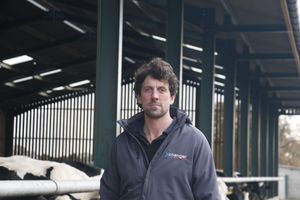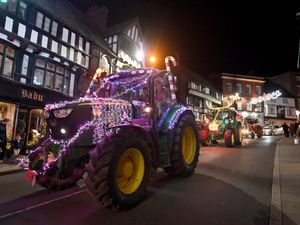Farmer says his land could be 'decimated' by Shrewsbury River Severn dam
A farmer in Shropshire has criticised council plans to build a dam north of Shrewsbury, claiming it could decimate his business and threaten animal welfare.
It is estimated the dam, being proposed by the River Severn Partnership (RSP), would increase water levels by five to six-inches in Melverley – one of the communities set to be worst affected if plans go ahead.
Richard Bowdler, a third-generation dairy farmer who milks cows in the area, said it would double the amount of his land that floods.
The Environment Agency and Shropshire Council, part of the RSP, seeks to reduce the risk of flooding from the River Severn for threatened areas by storing flood water higher up the river.

Mr Bowdler had hoped he would one day pass the farm on to his two young children, Tom and Bridget, aged five and three, but said he is worried the dam could leave the farm unviable.
“In a normal year about 55-80 acres of our land floods and we accept and manage that," Mr Bowdler said.
"But if the dam goes ahead it would make a one in 20-year flood a normal occurrence for us, flooding up to 130 acres of our farm."
Mr Bowdler added the water would breach his farm buildings, putting cow and staff welfare in jeopardy.
Recently investing in renewable energy to reduce his carbon emissions, Mr Bowdler practises good soil stewardship by ensuring river ground is always in grass to prevent soil erosion and improve water filtration, but said that could be wasted if the dam gets the green light.
Implications
Like many farmers along the River Severn, he is in a Nitrate Vulnerable Zone (NVZ) which means he has to have sufficient slurry storage for five months of the year. Farmers are then allowed to spread when conditions are dry, which ensures slurry doesn’t pollute the river.
But if flooding gets worse, Mr Bowdler said it wouldn’t be safe to put muck out even after the closed period ends, for fear of pollution.
He claims the Environment Agency has thought up proposals without considering the practical implications on the river ecology or wildlife.
The RSP, which has submitted the plans, said farmers would be compensated through the Environment Land Management (ELM) schemes.
But Mr Bowdler highlighted pilot schemes have only just been rolled out by the government and farmers are understandably worried.
“We would need to receive £350-400 per acre as compensation to be able to buy in forage to feed our cows from the ground we would lose," Mr Bowdler said.
"The government are not going to give us that. They can’t afford it. We are already in a recession. Where is this money coming from?
“Look at HS2. It has taken years. Farms have been ripped apart and farmers still haven’t received compensation.”
Mr Bowdler said something "must be done" to protect homes and businesses in Shropshire from flooding, but thinks the solution lies in controlling water flow further upstream in Wales, to prevent huge volumes of water threatening to break the banks of the River Severn in the first place.
He added that dredging the river could help – having seen good results in Somerset.




